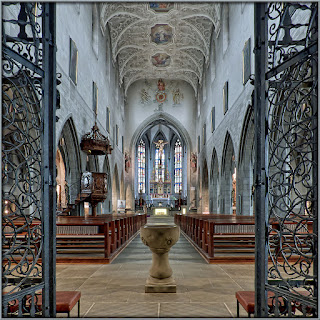Concision is an important part of the writing process. I think this always applies—being able to directly and intently describe ideas in any format is a virtue. After having written this post, I am writing this here preface to present the fact that I understand the value of concision, however elusive the blog format may make it. What follows is an anecdote and hearsay—but ultimately a piece which remains invested in answering a question: Is what I experienced in Radolfzell the perfect representation of the European relationship between space and community or was it just a holiday weekend?
Having read the preface, you are probably wondering, "what happened in Radolfzell?" Trust me its not as exciting as that makes it sound, yet it is thought provoking.
While in Radolfzell, Baden-Württemberg on the night of April 16th I, accidently, attended a Catholic Easter Mass. Well okay it was really 11:00 PM, and I did choose to attend, but I had not planed to attend nor be in Radolfzell at 11:00PM on a Saturday night. I was there with a group of friends with whom I spent Easter Weekend on the shore of Bodensee (Lake Constance), and we had just missed our connecting train from Konstanz, where we had spent the day, to Sipplingen, where our Airbnb was. While Deutsche Bahn deserves its own post, this missed train stranded 10 tired students in a town of 30,000 well after most things to do were closed.Luckily for us, the South of Germany is rather Catholic and being the night before Easter the local church (Münster Unserer Lieben Frau) was ablaze with festive dogmatic rituals and incense. The church is in the middle of the Altstadt, as it is in almost every every city, so without plans and a desire to explore we ended up at the church. After silently shuffling in the back we stayed until the end of the mass, about 30 minutes later. Having religious family members this was not my first Catholic mass, and while it was in German, I think the standout part of this experience is how it reconstructed my perception of the old churches in Europe.Since arriving here in January I have visited numerous Münsters, Doms, and even Alpine shines to saints. My engagement as a non-religious persons with Christianity in Europe has been ent
irely as a tourist. There is an old cartoon which I have thought a lot about while in Germany, which depicts "every European town" and labels the church as a tourist location in the center. While I've always known that Religion was a cornerstone of community in Medieval Europe, and that church spires were used as orientation for travelers before there was a standardize road network, the implications and consequences of these ideas escaped me.
By no means was I stepping back in time (this is a post Vatican 2 German mass where we sang hymns) but the experience brought to life many of the giant cathedrals I have visited, and the cities whose chapels I have seen. When the mass ended, the attendees dispersed through the streets surrounding the church, their conversations rippling through the night air. It was strange.
And then it dawned on me—this is the relationship between community and space that Radolfzell, or any other German town, has experienced for the past thousand years, and for one night I was able to participate in that display of belief, tradition, and location. According to Wikipedia, Radolfzell was founded in 826 CE around a monastery, meaning almost 1196 Easter Masses have taken place in this community, and a slim majority of them took place before the reformation.
Returning to my interest in this church and this Mass, I struggle to decide if this is the perfect representation of cultural difference because of the impossibility of having the same experience in the United States—based on time alone—or if the fact that I could've gone to an Easter Mass in Geneva, New York and had a similar experience is a great equalizer of sorts. For the sake of my overarching theme I will say that the construction of the community around the church in many European cities offered me a new perspective that I will, at the very least be bring to these blog posts.Note: In no way is this post an endorsement of any religious group, beliefs, or practices. I simply went to a church because it was the only building with lights on and realized it fit my Blocker theme.




Comments
Post a Comment